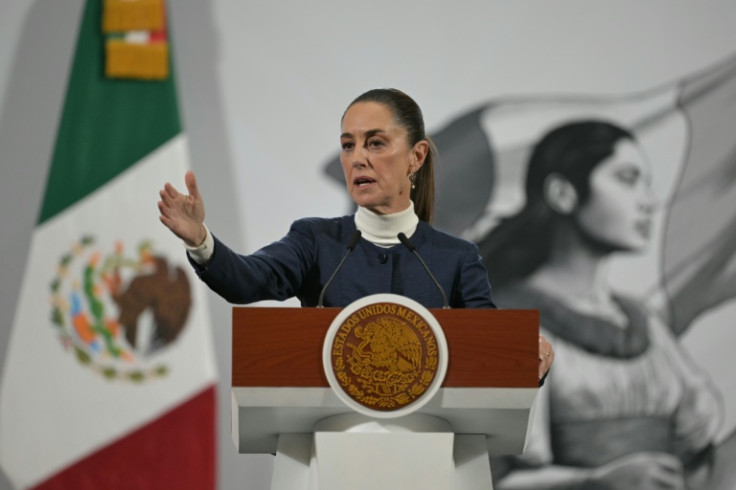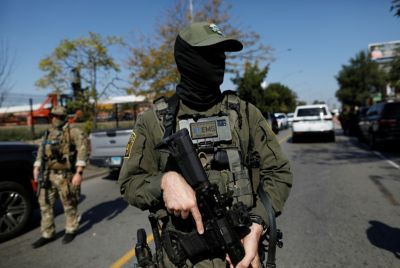Mexico's First Female President Almost Groped In Street Crowd, People Asks, 'Where's Her Security?'
Video of the 04 November 2025 incident went viral, prompting arrests, and a presidential complaint

'If this can happen to Mexico's first female president, what hope do ordinary women have?'
President Claudia Sheinbaum was groped and nearly kissed by a man while greeting citizens near the National Palace in Mexico City, an episode that has crystallised long-running public debates about street harassment, presidential security, and the enforcement of sexual-harassment laws in Mexico.
Sheinbaum said she had filed a formal complaint and called for tougher, nationwide penalties for sexual harassment, framing her decision as an act of solidarity with the millions of Mexican women who face daily abuse in public spaces.
Incident And Immediate Response
Video that circulated widely on social media shows an evidently intoxicated man approaching Sheinbaum during a short walk from the National Palace towards the Education Ministry, putting an arm around her and appearing to touch her before aides intervened and moved the man away. The episode took place on 04 November 2025 and was captured on multiple mobile phones and security cameras.
@tmz A disturbing video shows Mexican President Claudia Sheinbaum being groped by a man while meeting supporters in Mexico City 🫨 Full details link in bio!
♬ original sound - TMZ - TMZ
Mexico City officials said the individual was detained overnight and placed at the disposal of the city's Sex Crimes Investigation Unit, where prosecutors analysed the complaint the president subsequently filed. The city's mayor, Clara Brugada, publicly confirmed the arrest and called the act intolerable.
At her morning press briefing on 05 November 2025, Sheinbaum described the incident as 'an assault on all women' and announced she would press charges. In the same address, she said the episode had prompted her to ask for a review of state laws so that sexual harassment is criminalised nationally, and to commission a campaign to highlight respect for women's bodily autonomy. The president's office later published the full transcript and video of that press conference.
Security and the Question 'Where's Her Security?'
The images provoked immediate online outrage and a torrent of criticism directed at the presidential security detail. Commentators pointed to the delayed physical intervention by aides and asked how a man managed to reach the president in a crowded central square.
The episode revived scrutiny of a post-AMLO approach to presidential protection, both Sheinbaum and her predecessor chose to minimise heavily armed, elite protective units, partly for political symbolism, leaving a smaller entourage on public walks.
Security analysts said the incident underlined a trade-off between accessibility and safety. One academic source noted that high-profile leaders who prioritise public contact can be exposed to opportunistic attacks unless protocols and crowd control are carefully enforced; the lack of visible uniformed officers and the crowd's proximity made immediate containment harder.
At the same time, many women said the focal point should remain the routine impunity that allows harassment to persist everywhere, from buses to marketplaces.
Legal, Political, and Social Ramifications
Sheinbaum used her platform to frame the incident as a legal as well as cultural problem, urging a national review of how harassment is defined and punished. Mexico City already criminalises certain types of sexual harassment, but enforcement is uneven across the 32 federal entities. Sheinbaum asked the federal and state authorities to harmonise statutes so perpetrators face consistent penalties. Rights groups welcomed the move but warned that laws alone will not change ingrained attitudes without sustained enforcement and education.
The office of the city prosecutor and the national Secretariat for Women issued statements condemning the episode and reaffirming their commitment to investigate. The United Nations in Mexico issued a message of solidarity with Sheinbaum and urged public authorities to avoid normalising such violence.
Feminist organisations, while supportive of the president's complaint, also stressed that the episode should not eclipse long-standing criticism that government responses to femicide and gender violence require deeper institutional reform.
Politically, the incident is double-edged for Sheinbaum. Her decision to press charges underlines the leadership role she seeks in changing social norms; yet the optics of being unprotected in public have fuelled adversarial commentary about whether her access-first style exposes her and the state to unnecessary risk.
For many women on the streets of Mexico City, the immediate message was blunt: if even the president is not safe, the systemic problem feels entrenched.
© Copyright IBTimes 2025. All rights reserved.




















